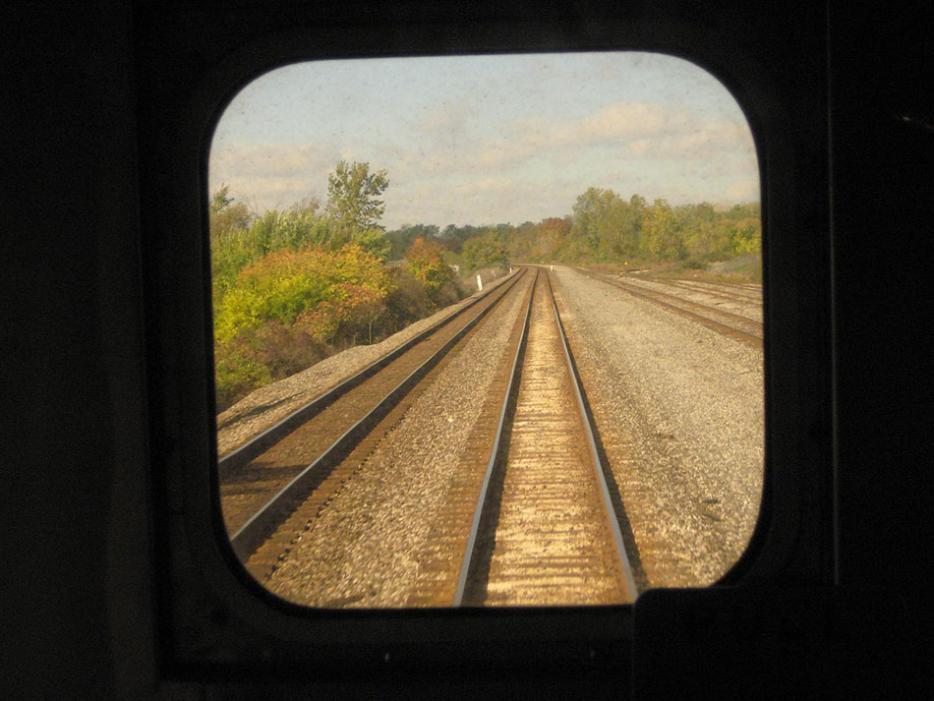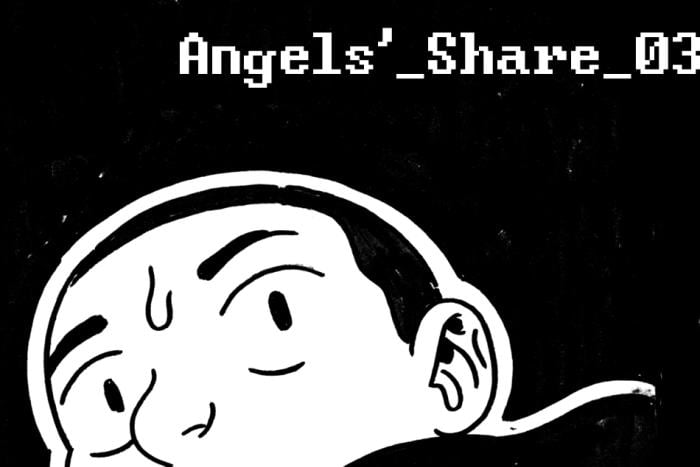What was important to us in 2015? Hazlitt’s writers reflect on the quiet reverberations of the year's big issues, and the loud ring of its smaller ones.
I’ll tell you in November, I replied when a friend texted me mid-October to ask how I was. We hadn’t spoken in a while, and he didn’t know I was about to leave my job. I didn’t feel like telling him. Instead, I deflected, asking him to plan us a trip somewhere fun, petulant and demanding. My last day at work was the last Friday in October; a week later we boarded a train. He brought two green apples, so big I couldn’t completely wrap my fingers around the smooth neon skin, and I brought Maggie Nelson and Zadie Smith, slim volumes to occupy us for the scheduled stretch of travel time.
I had promised to bring The Argonauts because he had mentioned he wanted to read it, and I wanted to remove the burden of conversation. He was, I thought, my companion, with his own reasons for travelling; relying on him for entertainment was an unfair burden. Also I didn’t have much to say.
Our destination was a museum but mostly the idea was to go, to leave, to move, even if I knew I would have to come back at the end of the day. Stillness was a great fear of mine in those first few weeks of unemployment. It still is. Momentum, trajectory, force: that’s what I want, and though an Amtrak train is a small consolation for the speed I need, at the time it seemed close enough.
Watching someone read a book I love is a trying experience. My impulses are to direct or position their readings, to make sure they’re noticing the details that stayed with me since I read it. In the window seat I had taken without asking, I focused on keeping my eyes on my own page. I was re-reading a book I’ve read dozens of times already, Smith’s collections of essays and criticisms. Occasionally I stopped to text another friend I knew was a constant re-reader of the same volume. “The time to make up your mind about people is never!” It's a line spoken by Katharine Hepburn in The Philadelphia Story, and Smith uses it to great effect in her eulogy for Hepburn. It’s also her epigraph and referenced in the title of the book itself, Changing My Mind. The time to make up my mind about people, I tapped my screen to tell my friend, is the only time I feel comfortable using the word “never,” and out of the corner of my eye I watched as my travelling companion put his finger on the corner of a page, but I didn’t ask what had caught his attention.
*
At only 143 pages, The Argonauts deals in the kind of verbal currency where our demand far exceeds the given supply: less is so, so much more. We’re given exactly—and only—what Nelson is prepared to share. Nelson writes about falling in love with Harry Dodge, an artist and filmmaker, and the years when they first began living together, spending time with Dodge’s son from a previous marriage and getting married under the shadow of California’s Prop 8. Nelson becomes pregnant with their first child as Dodge (who does not identify as part of a gender binary) begins to take T and undergoes a mastectomy.
The closest genre that fits is memoir, but the book itself is an examination of how words and labels and titles are our first point of emotionally expressive failures. The opening pages describe the way Nelson and Dodge argued over this point, Nelson a proponent of Wittgenstein’s theory that “the inexpressible is contained—inexpressibly!—in the expressed,” while Dodge believes that “[o]nce we name something…we can never see it the same way again. All that is unnameable falls away, gets lost, is murdered.” They both, in their own ways, concede to each other’s points: “I looked anew at unnameable things, or at least things whose essence is flicker, flow,” Nelson says. “I stopped smugly repeating Everything that can be thought at all can be thought clearly and wondered anew, can everything be thought.”
At a certain point our friendship changed, we were no longer acquaintances, he was another kind of travelling companion, in “this” together, no matter what, at that current week, we were defining as “this.”
The relationship between Dodge and Nelson is noticeably romantic, loving and sexual in equal measures, but most striking is the way they embrace their differences, their clashes, in their respective values and mediums. Privacy is one such contentious concern; Dodge jokes that their intense need for privacy is completely at odds with Nelson’s auto-theoretical approach to writing, comparing it to “an epileptic with a pacemaker being married to a strobe light artist.”
There are small references to Dodge’s hands throughout the book, asides that show the places where Nelson compromised, or removed, or edited, versions of events. After Dodge reads a first draft of the book, they go for lunch armed with pencils and Nelson’s pledge to put aside her sense of property in exchange for Dodge’s generosity. Her internal conflict (“But it’s my book, mine!” she thinks of Dodge’s proposed edits, before paraphrasing Dodge’s response: “Yes, but the details of my life, of our life together, don’t belong to you alone.”) is about losing her sense of ownership, of her very self. “I guess I wasn’t ready to lose sight of my own me yet,” she acquiesces.
*
This was the year I started thinking of the family I was building as well as the family I came from. I guess that’s partly age, partly circumstance. I’m living through the years when my peers make the choices that comprise roots, whether they’re setting them down or pulling them up, one after the other, like clockwork or calendar or some other mechanism for keeping time.
I had been, somewhat unconsciously, living my life in service to those calendars. I rated the most important moments in my life as The Very Important Moments, the ones easily described and instantly recognizable. Moving from one densely populated city to another did the trick; so did getting—then leaving—a good job. I liked moments that were simple, something I could easily point to, trusting whoever I was talking to could fill in the rest for themselves. Relationships START. Relationships END. Everything HURTS. Everything feels AMAZING. All highs, all lows, I would explain, with all the boring in-between moments kept to the absolute minimum.
At the same time, my idea of what a friendship was or should be—you know, proximity plus common values plus similar dislikes equals camaraderie, the kind of equations easily solved by dismissing a person once their sum no longer involves one or more of those parts—had changed, maybe when or because I wasn’t paying attention. I had reached a destination without even noticing I was in a moving vehicle; highway hypnosis, but for relationships. I had gotten somewhere while managing to forget I was even on the road to begin with.
The most important parts of our lives are what happens in between the common landmarks, the valleys of lived experience.
A better metaphor is a treadmill. Treadmills, I found out this year, are pretty ok in real life, not just as metaphors. Who knew! I began to meet one friend two or three times a week at a gym close to his office and my house, calling our informal agreement “health club” or “workout club” or “fitness club,” but the point was we were in this together, running being literally the worst thing in the world but not so bad if you have a sympathetic friend to bitch to during extended warm-ups and cool-downs. I was often sad, or mad, or some unholy combination of both during those first few runs, and his unending patience with my unrelenting complaints did, I think, guide me back on a path slightly less moody, although you would have to ask him for a more accurate assessment.
“How’s your heart?” he would sometimes text me in between scheduling times to meet, a question I loved even considering—probably because of—the melodrama. “Broken,” I replied only once, a concept I hated but one he had been advising me to get comfortable with. “I don’t like the connotations of that word,” I whined as we walked on parallel treadmills stationed in front of television shows we hadn’t been allowed to watch as children. “I don’t think that’s what I am.” I knew he would roll his eyes when I said that; probably that’s why I did.
Early on weekday mornings, or on rare grey weekend afternoons, I wondered how it was possible to satisfy my desire to move on a machine bolted in place. But it did. And at a certain point our friendship changed, as well. We were no longer acquaintances, he became another kind of travelling companion, we were in “this” together, no matter what, at that current week, we were defining as “this.” We talked and talked over the illusion of movement, staying in one place even as our legs sped away with us, and pledged to each other that our hearts would only beat for controlled intervals of speed and for people who treated us well.
*
Nelson named her book after the Argo, the ship from Greek mythology that kept its name even as it replaced every part it was made from. Renewal, not change, is the basis of every transformation that happens over the course of the book: falling in love, becoming pregnant, Dodge’s transition, and their children growing older are all particularly significant milestones.
But it is not the way Nelson writes about those big, universal moments, so common that the hardest part of writing about them is fighting the tendency to dismiss it all as banal. Lots of people become mothers; lots of people give birth. Even more people have mothers, are born. But it is Nelson’s deftness within the universal that makes her latest book so extraordinary. For this publication, Sarah Liss wrote about how reading The Argonauts helped her find her own personal vocabulary as a queer woman raising her first child, or, more accurately, to embrace the lack of vocabulary available as a source of freedom and strength. For The Awl, Katherine Bernard wrote about reading the book as a daughter to a distant mother, of finding the support she needs in a found family while carefully contemplating her genetic bonds. As Liss and Bernard both write so beautifully, the most important parts of our lives are what happens in between the common landmarks, the valleys of lived experience.
I couldn’t catch up with the amount of words we still had to say to each other but I liked our attempts to run after them.
Reading a book about step-parenting, Nelson finds some advice about not taking stock of family bonds every week or month or even year, to only stop and consider the family every seven years. “Such a time frame struck me then as ludicrous,” Nelson writes. “Now, seven years later, as wise and luminous.” It’s only during those long stretches that we get enough space and time to find out what has changed, what has stayed the same, what parts have been replaced under the names we’re stuck with.
*
In the spring I moved in with a woman who was my friend, former neighbour, and co-worker, and lots of people warned me that I was making a mistake; we already shared an immigration lawyer, dozens of friends, professional aspirations, and a predilection for cold glasses of Lambrusco sipped outdoors. How much closer could we actually get? At parties, people asked us if we were sisters, or somehow related, even though our physical similarities begin and end with both existing on this physical realm.
But maybe they knew something we didn’t. After a few weeks of living together, we accidentally discovered our last names meant the same thing in different languages: “hammer” in Polish and Russian, respectively. Words, I thought, would never be enough to describe who this person had become in my life, sister and friend and colleague all woefully inadequate.
After our month in a temporary sublet almost everything about our lives began to change. Our travels together were not even close to the path we had planned to be on. The trajectory of our lives, in the “after” area of our big move, began to feel less like something moving us forward and more like a series of increasingly sharp corners, so much so that I began to physically cringe sometimes for no discernible reason, shoulders hunched and breath held as though that might prepare me for whatever could be next. But the discovery that we were— in one linguistic sense—related felt like finding an inevitable miracle. At the surface our last names remained the same, even as everything about us changed, and we remained linked together.
How different those journeys would look if we had erased everything we were speeding away from.
When she had to return to our home city for a month, I felt her absence as acutely as I had felt her presence when we shared the thinnest bedroom walls. I texted her constantly, unable to let her go without taking me, in some form, with her. Once, we had an exchange while she was at a bookstore; she asked if she should buy The Argonauts, and I told her yes only because I wanted to talk to her about it, but that she was also welcome to borrow my copy once the last friend I had loaned it to returned it. I wanted her to read the part where Nelson tells Dodge about their long conversations, about how they left a stream of words trailing in their wake, and say that’s how she made me feel, like I couldn’t catch up with the amount of words we still had to say to each other but I liked our attempts to run after them.
*
The Argonauts, I tell everyone before I hand them my copy or push them to buy their own, is all the more satisfying read as a kind of companion to Nelson’s 2009 book Bluets. Part poetry, part memoir, part colour theory, and comprised of about a million other indefinable parts, I think Bluets is one of the most traded pieces of literature amongst my peers. Like The Argonauts, it is also an attempt to express the inexpressible but in reverse: Nelson writes about a family found in shared, overlapping pains, alternately addressing the book to a man who broke her heart and a friend who broke their spine.
I read Bluets when I was reeling, as so many of my friends who found it during those same tumultuous years, from the kind of heartbreak that feels too volatile to ever be anything but self-indulgent self-destruction. Our relationships, we told each other, were always doomed, always with the most inappropriate of partners, always a choice we made despite ourselves. But—then—we didn’t care. On the final page, Nelson directly speaks to her former lover, saying “I want you to know, if you ever read this, there was a time I would have rather had you by my side than any one of these words.” I know, I know, I know, I thought the first time I read it. What a loss that would have been, I think now, after reading The Argonauts. “What if where I am,” Nelson writes at one point in the book, citing Deborah Hay, “is what I need?” She explains that before she met Dodge, she had “always thought of this mantra as a means of making peace with a bummer or even catastrophic situation. I never imagined it might apply to joy, too.” How different those journeys would look if we had erased everything we were speeding away from. Speed was what I thought I wanted, but it was always distance. A train moving at a steady clip, a treadmill rolling in place, flights to new countries; none of those destinations mattered without the shared armrest, the sneakers moving in time with mine, the common wall.
The story of a family found outside of the traditional, conventional, limited sense of that word is, I’ve come to believe, the only story that matters. The work of building one is not precious, not melodramatic, not sentimental. It is both the very simple and very complex renewal of parts, a renewal that happens no matter where or how we’re moving beside the people we’ve vowed to stay with.
I like to think that every time we exalt over another found shared trait or belief, or another formative experience, or another reckoning with all the experiences in between the easily identifiable beginnings and endings of our lives, we’re reminding each other that the time to make up our minds is never. I held on to Smith’s citation of Hepburn’s line this entire year, as a talisman, until I felt as strongly about it as I did the dreaded heartbreak or the euphoric companionship. I mean: isn’t it all the same? In her dedication, Nelson thanks Dodge for “showing her what a nuptial might be—an infinite conversation, an endless becoming.” Our understanding of pain and loss are a lot closer to our understanding of happiness and love than we—I—like to think. It is not a coincidence that the most intensely wonderful friendships of my life formed during the most intensely awful periods. An endless becoming, a sincere commitment to “never,” the destination we’ll never reach. I will not have to make my mind up about anyone, ever. I was theirs and they were mine and maybe that would change and we would survive.
*
On that Amtrak train, I succeeded in holding my tongue, even as I wanted desperately to ask what was making my friend laugh, what made him flip back to the previous page to reread a certain passage. It was his journey and not mine and I would respect that even if it killed me, even if I wanted nothing more than to share in his reading.
As we neared our destination he stood to dispose of his coffee cup at the other end of the car. When he returned he picked up his book and opened it, hands on either side of the hardcover, but he looked at me instead of the page. We smiled at each other for just a second. “This is nice,” he said, and it was.






